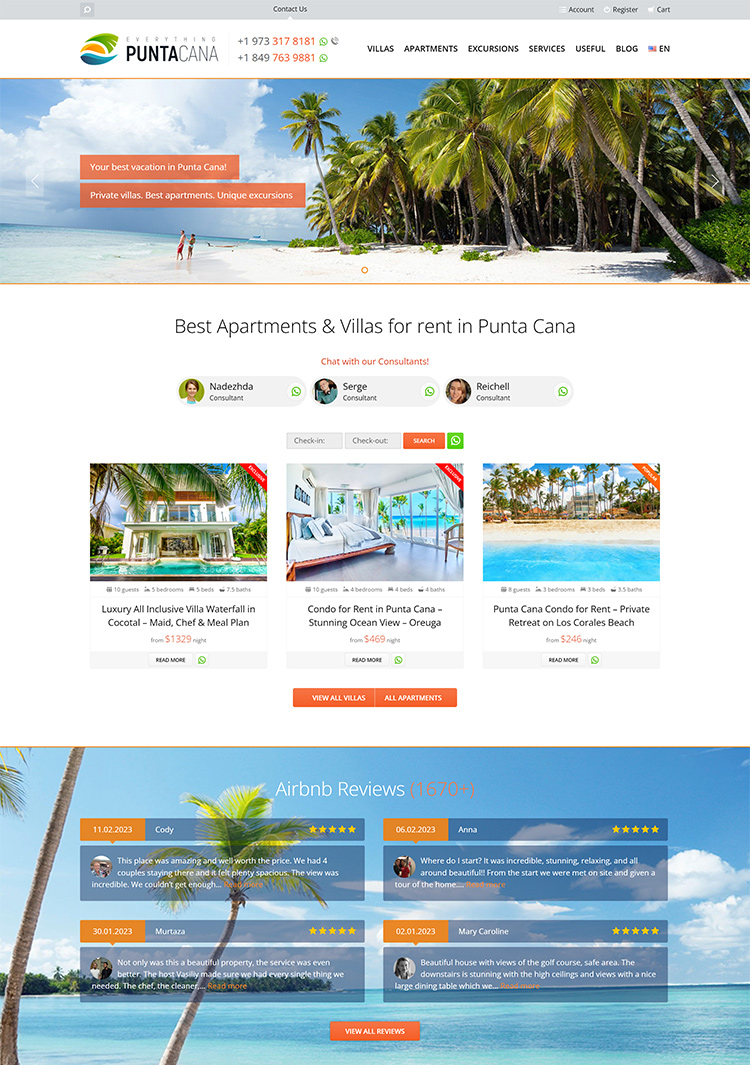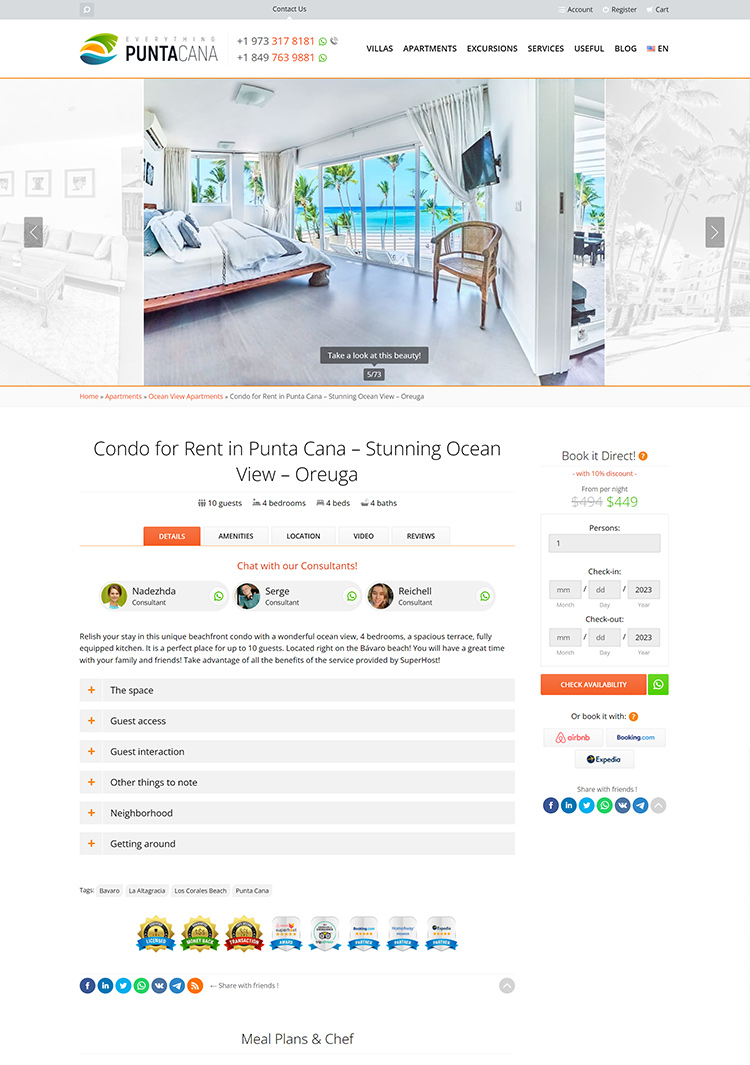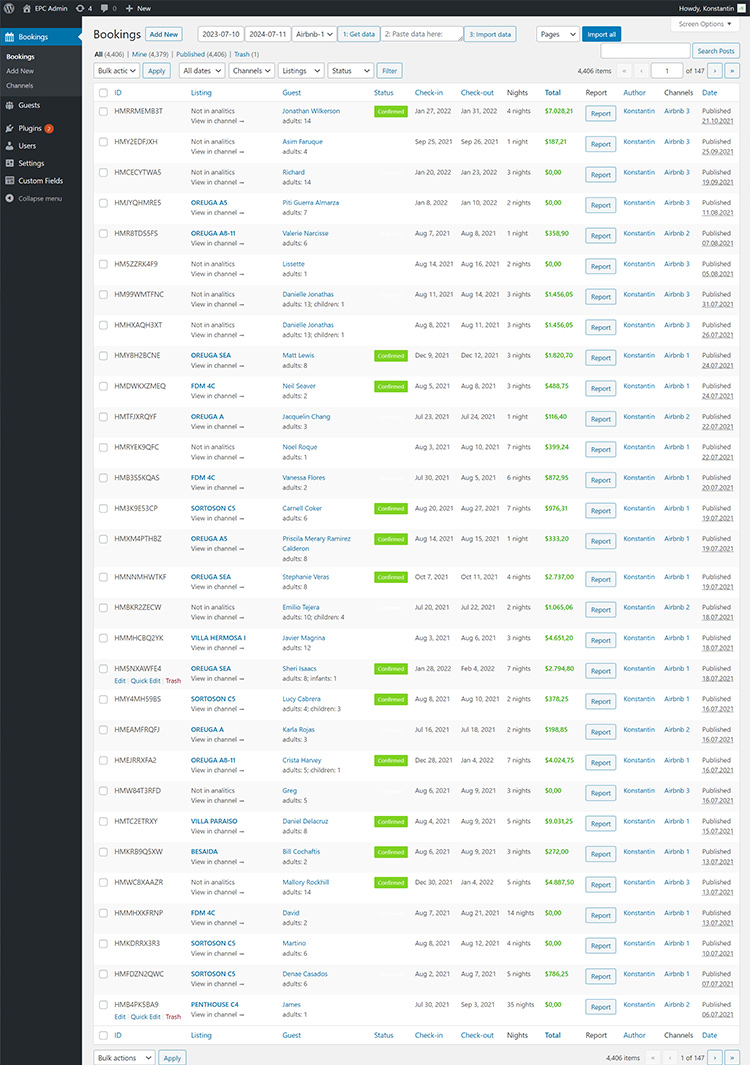Booking Engine Integration for Your Website -
Maximize Direct Reservations
The Package Includes:
Booking Engine & Payment Modules This includes a streamlined booking process, increased direct bookings, enhanced user experience, strengthened transaction security, and valuable data insights for strategic decision-making, empowering your business to thrive. ... Show all ↓
1 Week Of Free Maintenance If you encounter any issues with the booking engine, our team is ready to assist. We will address conflicts between plugins, resolve errors or glitches, and handle any other WooCommerce-related issues, aiming to simplify your experience by tackling technical challenges. ... Show all ↓
Based on WooCommerce & WordPress Our booking engine is built on WordPress and WooCommerce platforms, offering easy site updates and customization through WordPress, and secure online transactions facilitated by WooCommerce. ... Show all ↓
Stripe, PayPal Payment Integration This integration ensures a seamless and convenient payment process for your guests, enabling easy payment acceptance and expanding your customer reach. Clients can securely pay using preferred methods like credit cards or PayPal, with a dashboard provided for managing bookings, rate changes, and transactions. ... Show all ↓
From $2,375 /website
Feel Free to Get a Consultation!
Chat with our Consultants!
Request a Callback
Advantages of Booking Engine Integration
Examples of Our Work








Booking Engine Integration Tips
Integration and Implementation
Migrating from an existing booking system to a new one and ensuring it aligns with your website’s aesthetic involves several critical steps and approaches:
- Evaluate your current system’s data and functionality to prevent the loss of crucial features during migration.
- Select a vacation rental website provider that offers seamless migration support.
- Back up all existing data before initiating the migration process.
- Configure the new system according to your operational needs, including payment processing, booking policies, and property listings.
- Conduct thorough testing of the new system before its official launch to ensure full functionality.
To customize a booking engine to fit the look and feel of your website:
- Utilize CSS styling and HTML templates to mirror your brand’s visual identity, such as colors, fonts, and layout.
- Employ customizable widgets and APIs for deep integration, ensuring a seamless user experience.
- Some platforms offer drag-and-drop editors for easy customization without the need for extensive coding knowledge.
Addressing common challenges in booking engine integration:
- Challenges include data migration issues, maintaining consistent branding, and integrating with existing software systems.
- Mitigate these by selecting a booking engine that provides comprehensive support and flexible integration options.
- Effective communication with the provider’s technical support team is essential to overcome integration hurdles.
- Choosing a platform with a robust API and extensive documentation can simplify the integration process.
In the competitive market, integrating a booking engine that is both seamless and visually consistent with your vacation rental website is crucial. It not only enhances the user experience but also boosts booking conversions. Selecting the right platform and following a structured approach to migration and customization can address common challenges, ensuring a smooth transition to a more efficient and user-friendly system.
This concise approach aims to provide clear and actionable insights for those looking to migrate to a new booking engine or customize one to better fit their website, emphasizing the importance of a seamless transition and integration for enhancing user experience and boosting conversions.
General Understanding and Functionality
Integrating a booking engine with support for multiple languages and currencies, along with keeping up with the latest technological trends, are key factors in enhancing the user experience and competitiveness of a vacation rental website:
- A booking engine can support multiple languages and currencies through the integration of internationalization features, enabling users to browse and book in their preferred language and currency. This often involves geo-location to automatically present relevant options based on the user’s location.
- Emerging trends in booking engine technology include artificial intelligence for personalized recommendations, virtual reality tours of rental properties, chatbots for instant customer support, and a focus on mobile-first design. Considering that over 50% of bookings are now made on mobile devices, this trend is particularly significant. Additionally, there is a movement towards direct bookings to reduce dependency on third-party platforms, thus offering more control and reduced fees for property owners.
- To manage peak traffic periods effectively, a booking engine employs scalable cloud infrastructure, which automatically adjusts resources based on user demand. Advanced caching techniques and the use of content delivery networks (CDNs) help in speeding up load times across different regions. Moreover, heightened security measures are essential to mitigate the risk of cyber-attacks during these periods.
Adopting the latest technological advancements and ensuring scalability and support for multiple languages and currencies are pivotal for the success and global reach of a vacation rental website. By incorporating these features and staying abreast of technological trends such as AI, VR, and mobile-first designs, vacation rental owners can significantly enhance the booking experience, thereby attracting a wider audience and ensuring a competitive edge in the marketplace.
Specific Platforms and Solutions
Understanding the differences between proprietary and open-source booking engines, their compliance with accessibility standards, and the benefits of industry-specific solutions is crucial for selecting the right booking engine for your needs:
- Proprietary vs. Open-Source Booking Engines: Proprietary booking engines are developed and maintained by specific companies, requiring license fees but offering dedicated support and regular updates. They may offer less customization flexibility. In contrast, open-source booking engines are free to use and modify, providing high customization levels and community support. However, they might need more technical expertise for implementation and maintenance. Your choice should align with your needs, budget, and technical capabilities.
- Compliance with Accessibility Standards: Booking engines ensure accessibility by adhering to standards like the Web Content Accessibility Guidelines (WCAG). This includes text alternatives for non-text content, keyboard functionality, and easy navigation, aiming to be usable by people with various disabilities. Regular audits are common to maintain compliance.
- Industry-Specific Booking Engines: These engines cater to the unique requirements of sectors like hotels, vacation rentals, airlines, and car rentals, providing features specific to each industry such as room or seat selection and vehicle preferences. Industry-specific booking engines offer tailored user experiences and efficient management tools, whereas general engines may lack specialized features.
Choosing the appropriate booking engine—considering proprietary or open-source options, accessibility compliance, and whether a general or industry-specific solution best meets your needs—is essential for operational efficiency and customer satisfaction. A well-selected booking engine enhances your service delivery and booking experience, leading to increased bookings and loyalty.
The decision-making process involves balancing your specific requirements, budget considerations, and the technical skills available to you. By carefully evaluating each option’s advantages and limitations, you can select a booking engine that significantly boosts your business’s operational effectiveness and customer engagement.
Payment and Security
Focusing on the critical aspects of payment and security for a booking engine reveals several key points of compliance, fraud prevention, and multi-currency/payment gateway support:
- GDPR and Data Protection Compliance: Booking engines adhere to GDPR and other data protection laws by ensuring data privacy and security through secure data storage, encrypted data transmission, and mechanisms for user consent on data collection and processing. They offer users the right to access, correct, and delete their personal information, backed by regular security audits and compliance checks to uphold high data protection standards.
- Fraud Prevention Measures: To safeguard against fraud, booking engines incorporate secure payment gateways, CAPTCHA tests to block automated booking attempts, and real-time monitoring of suspicious activities. They further enhance security with two-factor authentication (2FA) for users and utilize advanced encryption standards. Additionally, some systems employ machine learning algorithms to detect and prevent potential fraudulent transactions.
- Support for Multiple Payment Gateways and Currencies: Modern booking engines are designed to support multiple payment gateways and currencies, offering flexibility and convenience to both property owners and guests. This feature allows guests to make payments in their local currency using their preferred method, improving the booking experience. The integration of various payment gateways also enables the booking engine to accommodate a global audience, facilitating international transactions smoothly.
Ensuring data protection compliance, implementing robust fraud prevention measures, and supporting multiple payment gateways and currencies are fundamental to the security and versatility of a booking engine. These features not only enhance user trust and satisfaction but also position your booking platform as a reliable and accessible choice for global users. By prioritizing these aspects, you can significantly elevate the overall security and operational efficiency of your vacation rental website.
In conclusion, the importance of a booking engine’s capabilities in complying with data protection regulations, preventing fraud, and accommodating various payment options cannot be overstated. These elements are crucial for building a secure, trustworthy, and user-friendly booking experience that caters to a global audience, ultimately contributing to the success and reliability of your online booking platform.
Support and Customization
When integrating a new booking engine into your vacation rental website, considering the level of post-integration technical support, update frequency, and customization options is crucial for ongoing success and operational efficiency:
- Technical Support Post-Integration: The support level varies, offering everything from basic email support to comprehensive 24/7 phone and live chat services. This includes access to a dedicated support team, online resources, and community forums, ensuring you have the necessary assistance for smooth operation. Regular updates, maintenance, troubleshooting, and technical assistance are integral parts of this support.
- Software Update Frequency: Booking engine software updates occur regularly, ranging from monthly to quarterly, enhancing security, introducing new features, and improving functionality. These updates aim to minimize service disruption, often scheduled during periods of low traffic. The method of implementation can be automatic or manual, tailored to fit the system architecture and customer preferences.
- Integration with CRM and ERP Systems: Advanced booking engines are capable of integrating with existing CRM (Customer Relationship Management) and ERP (Enterprise Resource Planning) systems. This facilitates seamless data exchange, optimizes operational efficiency, and offers a comprehensive view of customer interactions and financial data. Customizable modules and API access enable bespoke integration solutions to meet specific business requirements.
In the dynamic market of vacation rental websites, robust security, versatile payment options, reliable post-integration support, and regular software updates are essential for maintaining trust and convenience. The ability to customize the booking engine, including seamless integration with existing business systems, underscores a tailored approach that can markedly enhance operational efficiency and guest satisfaction. Opting for a booking engine provider that stands out in these respects is fundamental to the success and expansion of your vacation rental business.
The decision to select a booking engine with comprehensive support, frequent updates, and extensive customization capabilities will significantly impact the smooth operation and scalability of your vacation rental website. It ensures not only a seamless integration process but also long-term adaptability and growth in a competitive industry.
Benefits and Business Impact
To maximize the benefits of a booking engine for vacation rental businesses, it’s essential to understand its capabilities in analytics, revenue enhancement through upselling and cross-selling, and the expected return on investment (ROI):
- Analytics and Reporting: Booking engines provide a suite of analytics and reporting features, including real-time dashboards with data on bookings, cancellations, and revenue; segmentation reports to understand different customer groups; and conversion rate analysis for booking funnel optimization. Integration with external services like Google Analytics offers deeper insights, supporting data-driven decisions to improve business operations.
- Upselling and Cross-selling: Through the analysis of customer booking patterns and preferences, booking engines enable personalized recommendations for additional services or products at booking or check-in. This could include room upgrades, late check-outs, and local experiences, tailored to the customer’s profile to enhance their stay and increase revenue.
- ROI Timeline: The ROI timeline varies, with many owners seeing positive returns within 6 to 12 months of implementation. Factors contributing to quicker ROI include increased direct bookings, reduced commissions to third-party agents, improved operational efficiency, and better guest satisfaction, leading to repeat business and positive reviews.
A sophisticated booking engine is a game-changer for vacation rental businesses, offering invaluable analytics, enhancing revenue through strategic upselling and cross-selling, and delivering a positive ROI in a relatively short timeframe. The key to reaping these benefits lies in selecting a system that aligns with current business needs while providing scalability and advanced features to accommodate growth and evolving market trends.
Implementing a booking engine with these capabilities not only streamlines operations but also significantly impacts the bottom line and long-term success of vacation rental businesses. By focusing on these strategic advantages, property owners can make informed decisions, tailor guest experiences, and achieve faster growth in the competitive vacation rental market.
Marketing and Customer Engagement
To effectively leverage a booking engine for direct booking websites, focusing on marketing, customer engagement, and feedback is crucial. Here’s a simplified overview, enriched with actionable insights:
- Marketing Campaigns and Promotions: Booking engines enable marketing efforts through discount codes, special offer banners, and limited-time deals. They can integrate with email marketing platforms to dispatch targeted offers to past and potential guests. Dynamic pricing strategies are also supported, allowing adjustments to rates based on demand, seasonality, and booking behaviors to maximize revenue and encourage bookings during slower periods.
- Customer Engagement and Loyalty: Enhancing customer engagement and loyalty is facilitated through personalized user experiences, recommendation engines, and customizable booking flows. Booking engines support loyalty programs that reward guests with points or rewards for bookings. Automated communication tools for pre-stay, during-stay, and post-stay enhance guest experience and promote repeat business. Additionally, optimizing for a mobile booking experience is crucial as a significant number of users prefer to book travel through smartphones.
- Customer Feedback and Reviews: Booking engines foster the collection of customer feedback and reviews by integrating with review platforms or offering built-in feedback tools. These tools can automate review requests via email or SMS, simplifying the process for guests to share their experiences. Prominently displaying reviews and ratings on listing pages boosts credibility and provides valuable insights for potential guests.
Integrating marketing, engagement, and feedback tools into your booking engine is essential for driving bookings and building long-term guest relationships. Utilizing promotions, personalized experiences, and efficiently collecting customer feedback can significantly improve your vacation rental website’s visibility and appeal. This strategic focus can help vacation rental owners cultivate a loyal customer base and increase their competitive market presence.
In conclusion, leveraging a booking engine’s capabilities to support marketing efforts, enhance customer engagement, and facilitate feedback collection is vital for any vacation rental website looking to increase bookings and foster guest loyalty. These features not only improve the guest experience but also contribute to the growth and success of your business in the competitive vacation rental market.
Show all ↓
Benefits of a Booking Engine
for Your Website
Increase Direct Sales
Directly sell rooms through your website, eliminating commission fees from third-party channels. This not only boosts profit margins but also offers control over pricing and guest experiences, leading to a significant increase in direct reservations and profitability.
24/7 Availability
Your booking engine operates round the clock, allowing guests to book anytime and from anywhere. This constant availability maximizes your booking potential and ensures you never miss out on a reservation opportunity, leading to increased occupancy rates.
Seamless Integration
Easily integrate with property management systems, payment gateways, and other hotel technologies. This streamlined integration enhances operational efficiency, reduces manual errors, and provides a smooth booking experience for guests.
Enhanced User Experience
Offer a user-friendly, seamless booking process on your website. A booking engine with a simple, intuitive interface encourages guests to complete their reservations, leading to higher conversion rates and a positive user experience.
Personalization
Tailor the booking experience to meet guest expectations with personalized offers, room types, and additional services. This level of customization improves guest satisfaction and loyalty.
Capture Metasearch Bookings
Stay competitive on travel metasearch engines with real-time updates. This visibility increases your chances of capturing bookings from travelers comparing prices on platforms like Google and TripAdvisor.
Build Guest Loyalty
Implement a loyalty program through your booking engine to engage returning guests and encourage new referrals. A direct booking system is key to a successful guest loyalty strategy, fostering repeat business.
Drive Additional Revenue
Upsell in-property services and 3rd party activities through your website. Offering extra services enhances the guest experience and opens up new revenue streams for your property.
Brand Awareness
Strengthen your brand identity by customizing the booking engine to reflect your property’s unique value proposition. This not only builds trust but also enhances brand loyalty among your guests.
Trust and Security
Ensure a secure booking experience with SSL protection and compliance with payment processing standards. This security fosters trust among guests, making them more likely to book directly.
Improved Customer Support
Offer real-time support via integrated chat or callback features within your booking engine. This immediate assistance can resolve queries or concerns, leading to a more satisfying booking experience and higher conversion rates.
Promotional Flexibility
Easily manage and offer promotions, last-minute deals, and special discounts directly through your booking engine. This flexibility attracts price-sensitive travelers and can fill rooms during off-peak periods, boosting overall occupancy.
In-depth Analytics
Access detailed analytics and insights on booking patterns, guest preferences, and website performance. This data can inform marketing strategies, pricing adjustments, and improvements to the guest experience, driving more direct bookings.
Enhanced Guest Experience Pre-Arrival
Enable guests to plan their stay in advance by booking add-on services such as dining, spa treatments, or excursions through your booking engine. This pre-arrival engagement enhances the overall guest experience and anticipation for their stay.
Show all ↓
Frequently Asked Questions
How long does it take to integrate a booking engine?
The time it takes can vary widely, from just a few hours to a few weeks, depending on how complex your needs are and how much customization you want.
What is booking integration?
Booking integration links your website to a system that lets customers make real-time reservations and bookings directly online for your services or products.
How does a booking engine work?
A booking engine acts like an online receptionist for your business, allowing customers to see what you offer, check availability in real time, and book immediately, 24/7.
What is the importance of booking engine?
It makes booking easier and faster, lets your business be available to customers worldwide at any time, improving efficiency and increasing sales opportunities.
What kind of payment tools do you use with clients?
We use various payment methods including PayPal, Stripe, Zelle, direct bank transfers, and cash payment apps to handle transactions directly with our customers.
What is the function of booking engine?
A booking engine simplifies and automates making reservations online, making it easier for customers to book, ensuring real-time updates, and handling payments securely. It’s crucial for managing bookings more efficiently, improving the customer experience, and increasing sales.
How does online booking benefit a business?
Online booking automates the reservation process, saving time for both customers and the business, and allows bookings anytime from anywhere. It enhances customer satisfaction, expands your customer base, and improves cash flow with online payments. The data collected can also help make better business decisions.
Is a booking engine integration mobile-friendly?
Yes, booking engines are generally designed to work well on mobile devices.
Is there customer support available for booking engine integration?
Support is available through different channels like email, phone calls, or live chat.
What are the security features of booking engine integration to protect customer data?
To protect customer data, security measures include SSL encryption, secure payment gateways, compliance with privacy laws, PCI DSS standards, secure login processes, and regular updates to keep the system safe.
How does booking system improve customer experience?
By providing an instant, smooth, and straightforward booking process, which is essential for customer satisfaction in today’s market.
What types of businesses benefit from booking engine?
Any business that relies on appointments or reservations can benefit, including those in hospitality, travel, healthcare, fitness, and events sectors.
How Do We Work
Our team has 10 years of experience in creating websites for vacation rentals
Upgrade Your Site Today!
If you have any questions, need clarification, or require assistance with our services, pricing, or any other matter, feel free to contact us!



